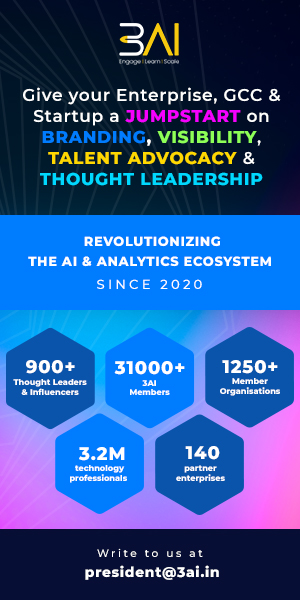How to progress your career to Analytics Business Leader
3AI January 12, 2017

A considerable amount of current conversation in the area of data science and analytics focuses on the virtues of solving all the challenges that organizations face when using this new paradigm in the business world. There is also a lot of discussion around the technology-related issues that impact achieving data science and analytics goals.
What hasn’t gotten the attention that it merits, however, is the role of business leadership and how thought leaders need to raise the stakes to become not only well versed in analytics, but to build data science and analytics literacy throughout their organizations. They need a heightened awareness of analytics if they are going to effectively drive analytics strategies and outcomes for their organizations and become true leaders in this area by all relevant measures.
The following three significant findings from align with this point of view:
- Create a culture for making fact-based decisions.
- Establish a common data science and analytics vision—and strategy—to focus everyone on the outcomes.
- Instill analytics expertise across the entire organization, from the top down.
Senior executives and business managers should aspire to create the core competencies and to develop analytical insights that enable them to become data science and analytics leaders within their industries. Education, mentorship, and consultation with outside advisors should be implemented to gain the knowledge necessary to attain a leadership role. When selecting a consultancy, business leaders should choose one that can advise, mentor, and support based on specific needs and levels of maturity, as opposed to those that may take a force-fit approach that essentially attempts to force a round peg methodology into a square pegenvironment. And a good grasp of numbers in respect to numerical literacy is also important in this age of fact-based decision making based on insights derived from large volumes of data.
Numerical literacy means acceptable levels of working knowledge and experience in decision science in which analytical techniques such as statistical and descriptive analysis, forecasting, and performance management can be applied. In addition, moving from a gut-based decision model to a fact-based one requires both cultural change as well as the tools and know-how required to create and manage the facts themselves. Finance teams can typically be the source of such competencies, and they can be used as a center for fostering and developing these competencies across the enterprise. It is ultimately at the mercy of top level management on how they are going to leverage their business acumen to instil a cultural change to foster data thinking.
Bringing In Data Mentors At The Very Top
Today’s executives and managers are trained primarily in operations, finance, marketing, and sales, along with a bit of strategy thrown in for good measure. While a significant number of senior executives in the US have advanced degrees in their field of expertise, few have been formally trained in information management, analytics, or decision science. Yet, virtually none have been schooled in decision science, information theory, analytics, or risk management. Lack of training in these areas creates a dilemma for those organizations that want to focus on data science and analytics but do not have experienced leaders who can lead from a position of domain expertise. But that wouldn’t mean stacking up data workers at the TLM (top level management). Leadership drive , domain insight and People Skills will still be the most coveted virtues at the very top. But the lack of ground level data-sifting skills need not be only plugged at the lower levels. To achieve these competencies without formal education or hands-on experience requires consultation with outside data mentors and advisors who can work hand in hand with the entire senior executive team. These advisors help ground the team in both the science and the pragmatics required to achieve successful data science and analytics outcomes that can be applied pervasively across the organization. This approach—some call it the “charm school” approach—can be characterized by a close collaboration among all parties involved. It can rapidly accelerate the process of nondisruptively developing the senior executive team’s data science and analytics expertise and competency to maximize strategic outcomes.
Data science and analytics success should be driven by the business, and more importantly from the ranks of its senior executives and managers—not from the bottom up or from the IT function. The inherent accountability for all strategic initiatives is at the very top of the organization and cascades down and across to business managers at various levels who then have responsibilities for its execution within their area of control. Organizations today remain hierarchical in both structure and cultural behavior. To change either of these structures requires engaged and competent senior executive teams that are committed to the outcome and can influence and align behaviors to support it.
Strategic Thinking in Data Monetization
A number of organizations have come to this realization already. They’re now engaging with management consultancies and analytics boutiques to address their shortcomings and accelerate results from their data science and analytics strategies and successfully monetize them. Alongside these mentoring activities, organizational leadership is strongly advised to consider organizational structures and change readiness as complementary endeavors. They can help illuminate the revisions to structure and Organizational Change Management (OCM) activities required to bring the entire organization to a level that they could start assessing the monetizing estimates of data thinking. These accompanying measures can also bring cohesion to the entire data science and analytics strategy and the pursuit of its outcomes.
Firms that are looking to monetize Data and their Data Science strategies, must look beyond the data and into the economic questions that the data can answer. Often the data can help answer questions about the value, use, risk, or future value or risk of a specific asset. Or the data can say something about an overall market and how asset classes perform and how customers behave generally. Such insights are understood to have great economic value to asset owners and market participants. However, not all data will offer these features or value. The temperature readings from inside our refrigerators are unlikely to alter markets. However, the temperature readings of our furnaces and air conditioners could, in aggregate, drive new energy conservation and policy decisions.
Transforming data into economic insights will be the focus of top level executives who will monetize data. This transformation will require the creation of data products. It may be that such data products can be sold or traded to clients. It can also be that giving away data products will drive other related monetization strategies. Hence creating the data product will not only require technical expertise with manipulating data but a clear vision on how data can be leveraged to answer economical questions and how the future market of the various domains will pan out.






